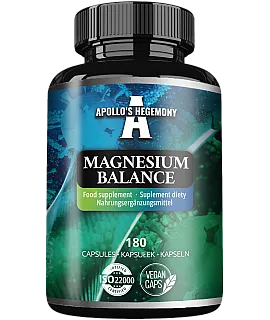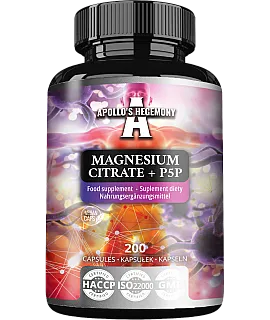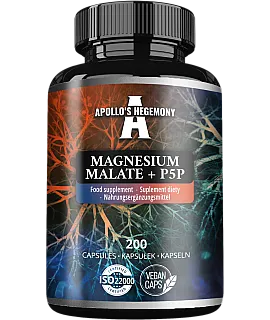What is the best-absorbed form of magnesium?

Magnesium preparations are among the most popular dietary supplements. This is not surprising, since the average person's diet is not particularly rich in this element, and supplementation is relatively inexpensive and produces quick results, which encourages consumers. Magnesium is a cofactor in more than 600 biochemical reactions, its role in the body is critical.
The high demand makes the choice of magnesium preparations very wide, and supplement manufacturers are very creative in extolling their own products. It is therefore worthwhile to approach the selection of a magnesium supplement for yourself judiciously, paying particular attention to the bioavailability of different forms of magnesium.
- Division of magnesium salts
- So what is the best absorbed magnesium?
- Choose from organic forms of magnesium
- Choose from inorganic forms of magnesium
- Why is magnesium supplementation so important?
Division of magnesium salts
The most general division of magnesium salts includes organic and inorganic salts. Assigning some form of magnesium to either of these groups will give you preliminary information about whether it is worth considering buying. Well, organic salts are considered to be much better absorbed than their inorganic counterparts, and this information is emphasized in most scientific publications discussing the bioavailability aspect of magnesium.
Organic forms of magnesium:
- magnesium citrate
- magnesium lactate
- magnesium malate
- magnesium taurate
- magnesium diglycinate
- magnesium gluconate
- magnesium threonate
- magnesium aspartate
- magnesium hydrogen aspartate
- magnesium picolinate
- magnesium orotate
Inorganic forms of magnesium:
- magnesium oxide
- magnesium carbonate
- magnesium chloride
- magnesium sulfate
So what is the best absorbed magnesium?
It's hard to pinpoint the best magnesium because there are many forms of magnesium, and there are no reliable publications that analyze the bioavailability and effects on humans of all of them in the same methodology. This is not due to a lack of interest in the subject, but more to the fact that such studies are quite problematic and hard to design. In short - a reliable and credible comparison of the bioavailability of all forms of magnesium simply does not exist.
However, there is a lot of data that can be collated to detail a few of the most noteworthy products. Often, scientists study the bioavailability of one selected organic form versus an inorganic form, possibly 3-4 forms at a time. Nevertheless, a good magnesium should have both good bioavailability and an action profile suitable for your expectations, as the action of different forms of magnesium differs subtly. The differences may lie, among other things, in the effect on intestinal function or on mood.
There are also factors that interfere with the conclusions. One is that the degree of bioavailability may not be constant, but, for example, be dose-dependent. In other words, the more is used in a serving, the lower the bioavailability may be. Absorbability can also vary depending on whether the formula is in powder, capsules, dissolvable lozenges or tablets (and how highly compressed). Different forms also have different distribution characteristics in tissues, and this is a parameter independent of the level of absorption in the gut. That is, regardless of the percentage of absorption, other preparations of magnesium may be useful, for example, for improving mood, and others for reducing cramps.
It is also interesting to note the researchers' conclusion that to maintain optimal magnesium levels, any form of magnesium in a supplement should work, and that a deficient state requires more attention.
Getting to the point, below you will find information on which forms of magnesium to look out for.
Choose from organic forms of magnesium
For general use and supplementation of magnesium deficiency, citrate and lactate have the strongest background in research. Both have excellent bioavailability. In dietary supplements, magnesium citrate reigns supreme, and this is no accident. Great bioavailability, a mass of scientific publications, a sizable percentage of magnesium ions in the raw material and good cost-effectiveness - these are the factors responsible for the success of magnesium citrate.
If you are looking for an inexpensive, well-absorbed and versatile magnesium - just choose citrate.
Supported by good bioavailability in the literature, there are also magnesium aspartate and magnesium gluconate. These two, however, are rarely found in supplements, and are more likely to be found in medications.
Other forms of magnesium readily available in supplements that have great bioavailability and interesting effects, but are slightly more expensive than citrate, are magnesium taurate, magnesium malate, magnesium diglycinate and magnesium threonate.
The choice between them is worth making based on the profile of action. For example, malate is gentler on the gut than citrate, so it is chosen for digestive problems. Taurate has beneficial effects on the cardiovascular system. Diglycinate is recommended for evening use. Threonate, on the other hand, very efficiently increases the concentration of magnesium in the brain and is useful for supporting cognitive function.
Tip: the presence of vitamin B6 further improves magnesium absorption, transport into cells and maintenance of intracellular stores. If you have no contraindications to its use, then choose a supplement with magnesium and added vitamin B6.
Choose from inorganic forms of magnesium
If for some reason you opt for inorganic forms, then magnesium chloride will be the best choice, as it has very good solubility in water and its assimilability in humans is the best. It will be followed by carbonate. Magnesium oxide has extremely low bioavailability, and its use only makes sense during constipation, as it stimulates the intestines to work. Magnesium sulfate is poorly absorbed orally, but it has great use in clinical practice in intravenous form.
Why is magnesium supplementation so important?
Magnesium is the fourth most important cation in the human body. Participating in more than 600 enzymatic reactions, it performs many physiological and biochemical functions. It participates in macronutrient metabolism, protein and DNA synthesis, regulates neuromuscular excitability and parathormone secretion. It affects vascular tone and blood pressure, as well as the body's water balance.
If you have an actual deficiency of magnesium in your cells (a blood magnesium test doesn't always show this) then including any of the organic forms of magnesium in your supplementation should have a quick and easily noticeable effect. In practice, once magnesium is supplemented, it usually improves mood, reduces nervous tension and improves sleep quality, if there have been any problems in these aspects.
Sources:
- Pardo MR, Garicano Vilar E, San Mauro Martín I, Camina Martín MA. Bioavailability of magnesium food supplements: A systematic review. Nutrition. 2021 Sep;89:111294.
- Jablecka, A., Korzeniowska, K., Skoluda, A., Cieślewicz, A., (2011), Magnesium preparations, Contemporary Pharmacy, 29-32
- Karmanska, A., Stanczak, A., Karwowski, B., (2015) Magnesium current state of knowledge, Bromat. Chem. Toxicol. - XLVIII, 677 - 689
 ⮜ Previous article
⮜ Previous article
PQQ as an antioxidant to increase mitochondria
 Next article ⮞
Next article ⮞


